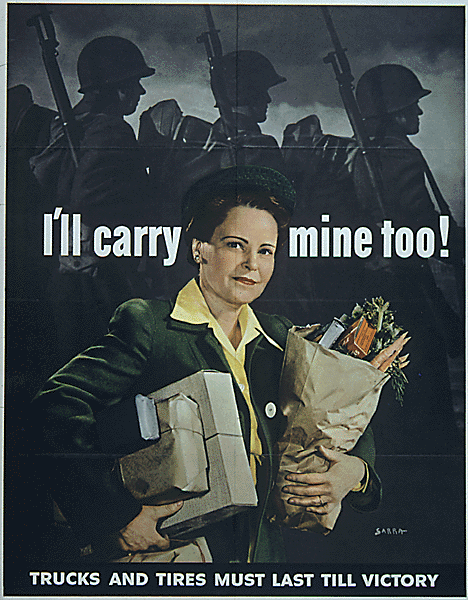|
Okay, so this is only peripherally about food, but it's an important image to give some context about. During both World War I and World War II, gasoline was in short supply. It and rubber tires were actually rationed during the Second World War, as evidenced by the propaganda poster above. In it, a woman walks along, her arms full of packages. In the background, the silhouettes of soldiers, bayonets fixed, packs full, march behind her. She says, "I'll carry mine, too!" making a clear reference to the packs the soldiers behind her are carrying. Below it says, "Trucks and tires must last till victory." This image needs some context because most modern Americans don't realize what grocery shopping was like before the 1950s. As a rule, most cities did not have supermarkets as we know them today. That development was starting in the 1940s, but it was not until the end of the war that being able to roam a large store with a shopping cart and help yourself was a common occurrence for most ordinary Americans. Most Americans in the first half of the 20th century visited individual shops - a greengrocer for produce, a butcher for meat, a bakery for bread and pastries, and often yet another store for canned goods or staples like flour, sugar, and coffee. In big cities, you might also visit a cheesemonger, pickle store, or other specialty shop. Milk and other dairy products were obtained from a fluid milk dealer, who delivered. Although early in the century lower-quality milk was sometimes also available "dipped," meaning you brought your own pail and they dipped it out for you. This was largely consumed by folks who could not afford to have higher quality bottled milk delivered. But many families also had other food products delivered. It made sense prior to the First World War. After all, milk, ice (for your ice box), and coal were already delivered. It was simple enough to use a telephone to place a weekly or even daily order from the butcher and greengrocer. But wartime meant efficiencies. So delivering small items to individual households multiple times a week was a waste of manpower and fuel. The campaign to cut down on deliveries started during the First World War as housewives were encouraged to actually visit the stores they ordered from. Propaganda persuaded housewives that they could better keep an eye on quality and sanitation if they went themselves. Which was likely true, as some housewives may have been duped by unscrupulous shopkeepers. But housewives visiting those shops themselves would have still had to place a request with a shop clerk, who would retrieve the items and weigh or measure them for you from bulk. With the exception of the increasing popularity of brand name products, many people still bought "generic" bulk goods. Gelatin, coffee, canned soups, boxed cereals, crackers and cookies, condiments like ketchup and mustard, spices, and coffee and tea were increasingly purchased pre-packaged. But someone else brought the package down from the shelf for you. That way of shopping was changing by the 1940s, but home deliveries still abounded. During World War II, the emphasis was on saving fuel and tires. By walking and carrying her own goods, the housewife was saving on fuel, rubber, and manpower, too. Of course, changes to housing patterns post-war would also play a role. The development of suburbs meant that no longer could the housewife walk or take public transportation to the nearest store. She had to drive. Driving meant she could carry more, and bigger refrigerators and new deep freezers meant she could shop less frequently, too. It was a sea change in how life was lived. And the repercussions are what many people are trying to escape today, with a return to mixed-use and walkable neighborhoods. Despite living only a mile or so away from several grocery stores, there are no sidewalks in my neighborhood and I live on a very busy road where the speed limit is 55 mph. Which means I have to drive to stay safe. But I try to combine trips on my way home from work to be more efficient. In this day and age, communities are also increasingly banning or restricting the use of plastic bags. The county I work in has a total ban, and charges 5 cents for paper bags. As a result, I've started carrying reusable bags with me more often. But the lack of plastic packaging in this image is striking - the boxes are wrapped in brown paper and tied with string. In her paper bag, a bunch of carrots with green tops pokes out of top, along with what appears to be celery and paperboard boxes - maybe pasta or cereal? At any rate, it's a striking image, and one with some lessons in sustainability. Could we ever go back to an era of paper, cardboard, tin, and glass when we are currently so addicted to single-use plastic? Something to think about. How do you do your shopping? If you enjoyed this installment of #WorldWarWednesdays, consider becoming a Food Historian patron on Patreon! Members get access to patrons-only content, to vote for new blog post and podcast topics, get access to my food library, research advice, and more!
0 Comments
Your comment will be posted after it is approved.
Leave a Reply. |
AuthorSarah Wassberg Johnson has an MA in Public History from the University at Albany and studies early 20th century food history. Archives
July 2024
Categories
All
|


 RSS Feed
RSS Feed